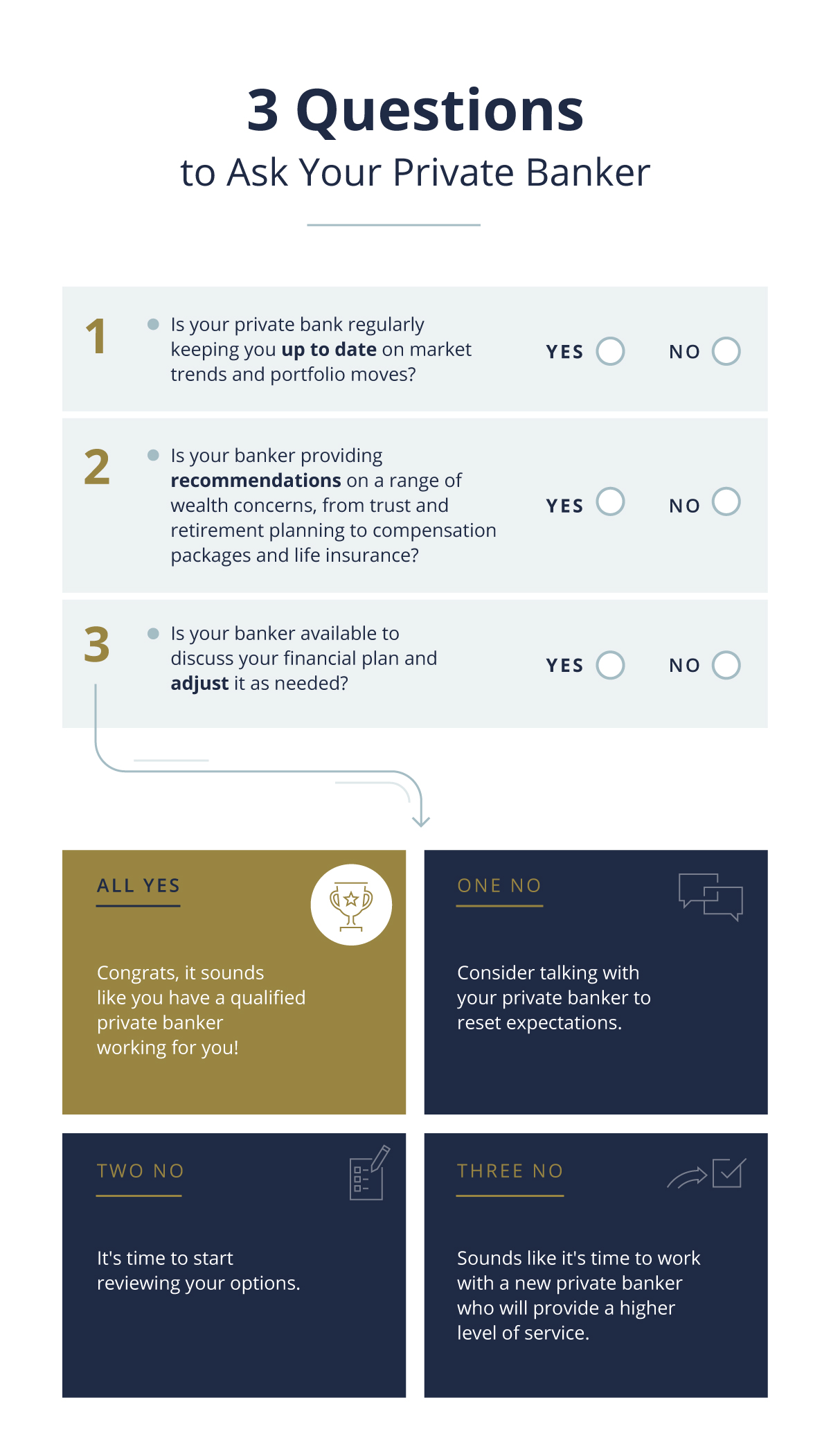INFO :
Our offices will be closed on Monday, February 16, in observance of Presidents' Day.Like any successful professional interaction, your relationship with your private bank should be dynamic — addressing current goals while anticipating future ones. Private banking offers a range of personalized services for high-net-worth individuals that can include banking, debt strategies, investment management, tax optimization, and retirement and estate planning.
Working with a private bank means you have access to a dedicated banker who understands the complexities of wealth management, which allows you to focus more on your personal and professional interests and less on managing your portfolio. With this in mind, it’s important to make sure you are getting the most out of the relationship.
Here are six things to consider when gauging whether your private bank is working well for you:
1. Does your private bank offer the right expertise?
It’s not enough for a private bank to provide financial and legal expertise to support comprehensive wealth management — that’s to be expected. Many private bankers hold professional certifications, including the Chartered Financial Analyst (CFA), Certified Trust and Fiduciary Advisor (CTFA), and Certified Financial Planner (CFP). But to set up a private bank relationship for the greatest success, your banker should also have the flexibility to tailor financial solutions and portfolio strategies to advance your goals.
Your banker should also have the self-awareness to recognize instances when they need to consult with colleagues within the private bank or other experienced and credentialed professional advisors. For example, they should have qualified referrals available if you're mulling long-term care options for you and your spouse or looking to grow your business.
2. Are you getting more than just banking services?
The services your private banker provides to you should depend on the scope of your holdings and your personal preferences. The relationship often goes beyond banking services and portfolio management to encompass insurance needs, tax strategies, and retirement and estate planning.
Your private banker should share their wealth management expertise, keeping you up to date about trending topics and offering insights for addressing them. For example, if the market experiences volatility, you should hear your private banker’s perspective on it. Ask yourself whether your advisor is anticipating your needs and responding appropriately with timely recommendations.
3. Are you satisfied with the amount of attention you're getting?
With a private bank, the level of service should align with the needs of the account and your personal preferences. It should offer a flexible engagement type and cadence. For example:
- You may prefer monthly or quarterly updates.
- You may want to meet in person, or maybe you prefer by phone or even video call.
- If action steps or additional information is needed, you may want your banker to follow up immediately or within a certain window.
- In between regular check-ins, you may want to receive periodic email or phone updates beyond automated transaction notifications.
Whatever the level of service you require, it's up to the banker to ensure your expectations are met.
4. Is your portfolio being reviewed regularly?
Behind the scenes, your private banker should be regularly monitoring your portfolio and offering updates on your investments, recommending appropriate changes, and revising your financial plan accordingly. This personalized approach will help optimize your account to allow you to realize your short- and long-term goals.
Beyond these regular reviews, your banker may want to conduct a more holistic review on an annual or semi-annual basis to help ensure you're remaining on track.
5. Is your private bank helping you reach your personal goals?
Whether you’re focused on charitable giving, ensuring your family’s legacy for future generations, or looking to purchase a vacation home, your private banker should help create a plan to help you and your family reach these goals. Just as importantly, your private banker should ensure this blueprint aligns with any changes in your family, career, or financial life and revise it to reflect your evolving priorities.
6. For business owners, is your private bank helping you scale?
The day-to-day of running a business can be made easier when your private bank shares insights for successful management and growth strategies, including cash flow management, insurance needs, and succession planning. A private banker can also simplify your operations by offering services for managing your accounts, payroll, and credit cards, as well as acting as the administrator for an employee retirement plan.
The private banking relationship can also help you position your enterprise for growth, whether through a business line of credit, loans, and mortgages, venture capital, private equity, or other types of investments.
Is it time to explore a new private bank?
With private banking, the focus should be on accommodating your unique needs and personal preferences, not the other way around. As you build your wealth, you will likely find that the path to your goals becomes more complex, requiring you to navigate new opportunities and risks.
A private banker serves as a strategic partner who can help ensure you not only make the right investments but that your strategy aligns with your objectives and the current market conditions. Your future deserves more than a "set it and forget it" approach; a private bank ensures your portfolio gets the attention it requires. Make an appointment with Fulton Private Bank to see whether our client-focused approach to wealth management is a fit for you.


